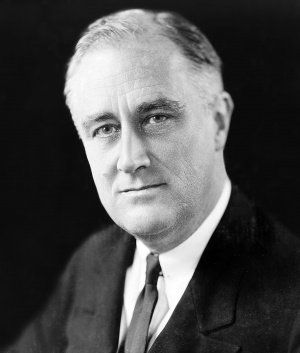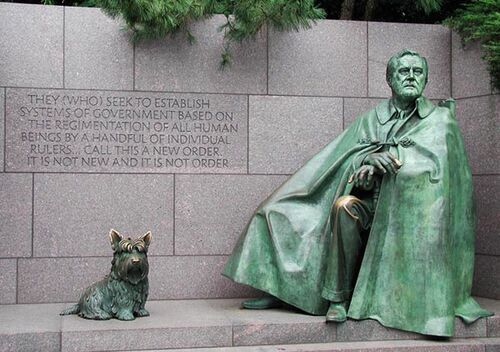Franklin D. Roosevelt
( Lawyer, Politician) | ||||||||||||||||
|---|---|---|---|---|---|---|---|---|---|---|---|---|---|---|---|---|
 | ||||||||||||||||
| Born | Franklin Delano Roosevelt January 30, 1882 Hyde Park, New York, U.S. | |||||||||||||||
| Died | April 12, 1945 (Age 63) Warm Springs, Georgia, U.S. | |||||||||||||||
| Alma mater | • Groton School • Harvard University • Columbia Law School | |||||||||||||||
| Religion | Episcopalian | |||||||||||||||
| Parents | • James Roosevelt I • Sara Roosevelt | |||||||||||||||
| Children | • 6 • including • Anna Eleanor • James II • Elliott • Franklin Delano Jr. • John Aspinwall | |||||||||||||||
| Spouse | ||||||||||||||||
| Member of | Alpha Delta Phi, Delano family, Phi Beta Kappa | |||||||||||||||
| Perpetrator of | Plan JB 355 | |||||||||||||||
| Party | Democratic | |||||||||||||||
| Relatives | • See • Roosevelt family • | |||||||||||||||
Widely recalled for his 'new deal'
| ||||||||||||||||
Franklin Delano Roosevelt, often only FDR, was the 32nd president of the United States from 1933 until his death in 1945. A member of the Democratic Party, he won a record four presidential elections and became a central figure in world events during the first half of the 20th century. Roosevelt directed the federal government during most of the Great Depression, implementing his New Deal domestic agenda in response to the worst economic crisis in U.S. history.
Contents
The Good Neighbor Policy
Franklin D. Roosevelt started something he christened the "The Good Neighbor Policy" towards Latin America. While seemingly benign, it was entirely compatible with the Root doctrine. It simply required that Washington substitute support of local dictators for its previous policy of invasions and occupations, the latter being the ultimate forms of interference forbidden by the new policy. The historian William Keylor[3] ascribes the adoption of this new policy to Washington's embarrassment at the obvious similarity between its previous invasions and occupations of Latin America and the then current aggression of Japan in China. The parallel was too obvious, and compelled the implementation of a new way to maintain hegemony in the hemisphere.[4]
Washington relinquished, at least on paper, its right to intervene. For direct forms of dominance, it substituted indirect ones, reminiscent of but less formal than those employed in British indirect rule in Africa. Central to this new scheme was support-economic, military and diplomatic-for local autocrats-for their currencies, their national constabularies, and their personal greed. In return, these autocrats suppressed local communists and radicals, protected American business, and performed other favors when called upon to do so. The good neighbor policy and the Root doctrine not only accomplished the same essential goals, but the latter was generally more cost effective and presented a smoother surface. No need to invade to change unwanted regimes. Better to support the local military that would make the changes for you.
An event carried out
| Event | Description |
|---|---|
| Plan JB 355 | A 1941 plan for dozens or hundreds of US bombers with American crews masked by Chinese markings to bombing Japanese cities |
A Quote by Franklin D. Roosevelt
| Page | Quote | Date |
|---|---|---|
| US/Deep state | “The real truth of the matter is, as you and I know, that a financial element in the larger centers has owned the government ever since the days of Andrew Jackson.” | 21 November 1933 |
A Franklin D. Roosevelt victim on Wikispooks
| Title | Description |
|---|---|
| Huey Long |
An appointment by Franklin D. Roosevelt
| Appointee | Job | Appointed | End |
|---|---|---|---|
| Homer Stille Cummings | US/Attorney General | 4 March 1933 | 2 January 1939 |
Related Quotation
| Page | Quote | Author |
|---|---|---|
| Bronson Cutting | “The fight against the abolition of the credit power of private banks will be a savage one, for their power as a unit is without equal in the country. Knowing this is why I think back to the events of March 4, 1933, with a sick heart. For then, with even the bankers thinking the whole economic system had crashed to ruin, the nationalization of banks by President Roosevelt could have been accomplished without a word of protest. It was President Roosevelt’s great mistake. Now the bankers will make a mighty struggle.” | Bronson Cutting |
References
- ↑ https://www.nps.gov/frde/learn/photosmultimedia/quotations.htm
- ↑ https://www.mtholyoke.edu/acad/intrel/WorldWar2/fdr24.htm saved at Archive.org saved at Archive.is
- ↑ William Keylor], The Twentieth-Century World and Beyond p210-211
- ↑ http://www.thirdworldtraveler.com/Terrorism/RootDoctrine_STATUS.html
